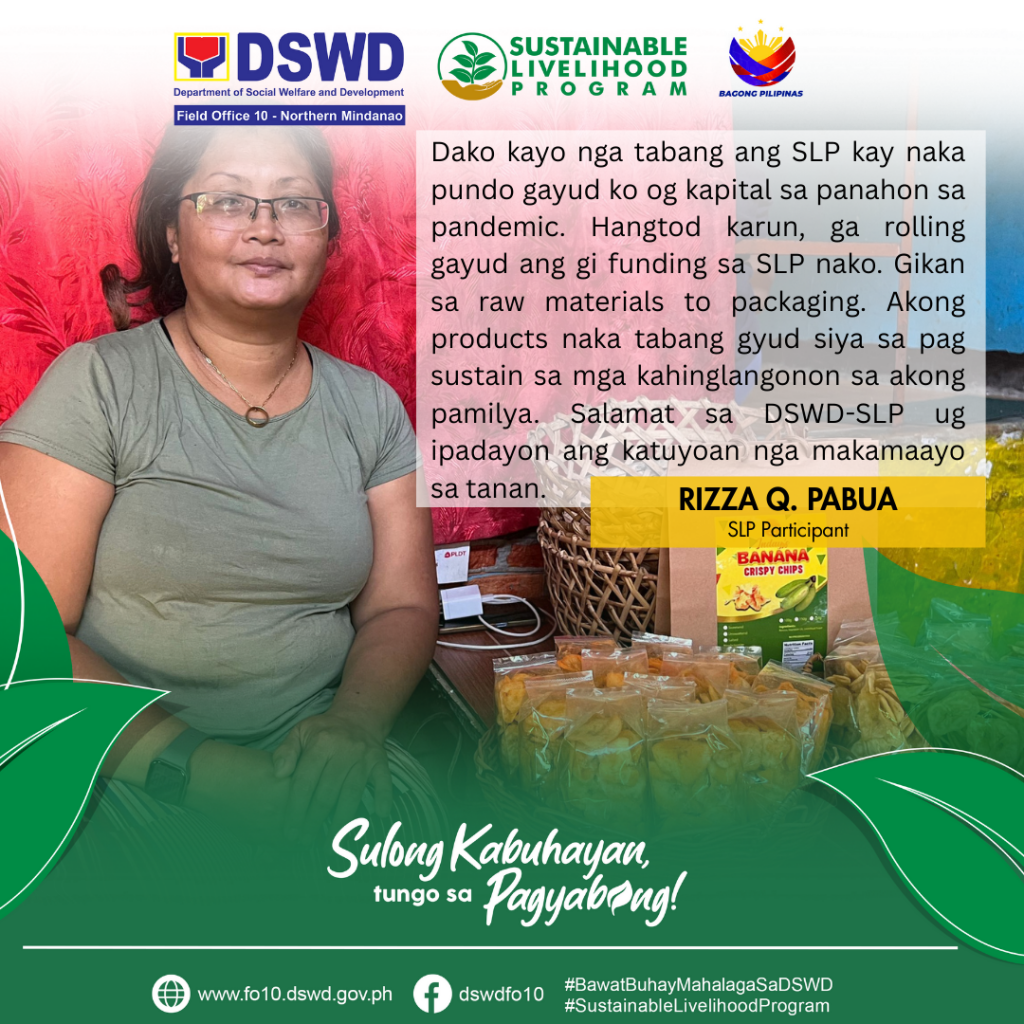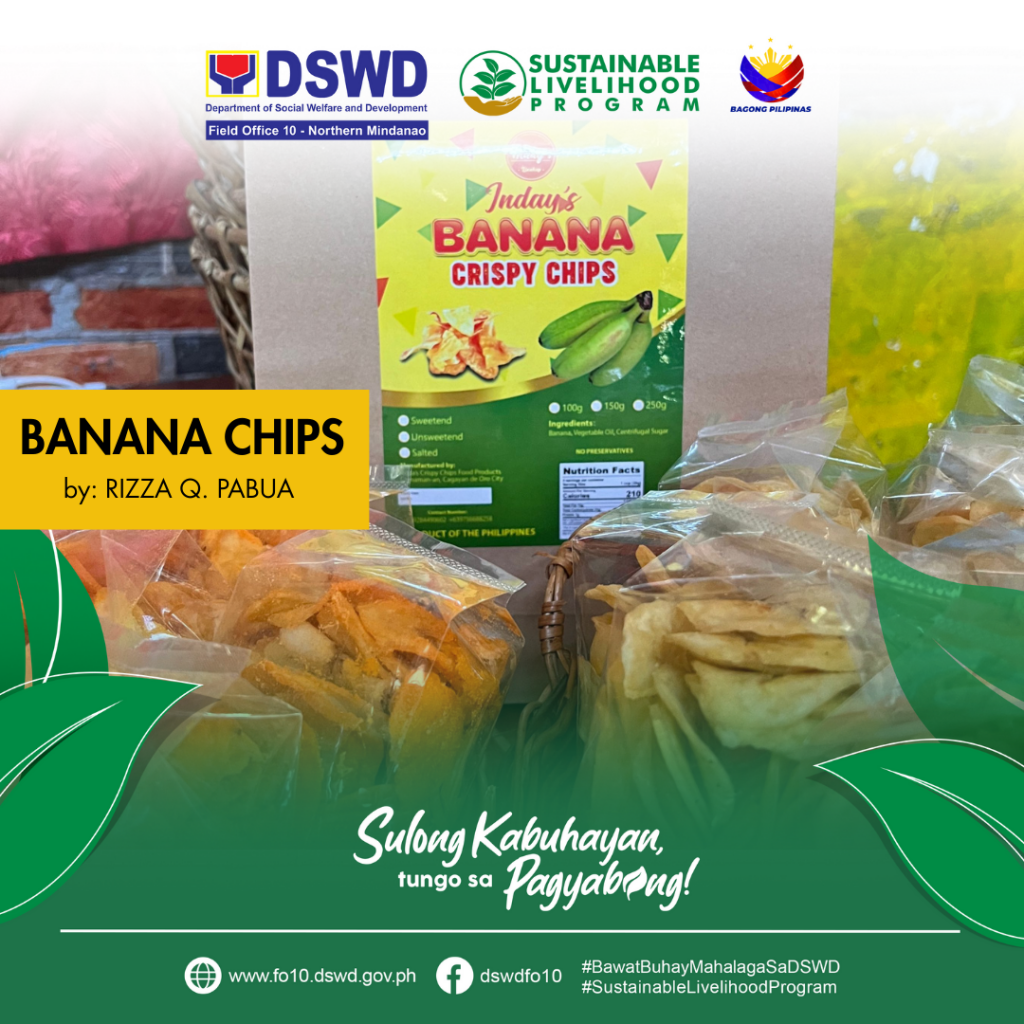As the world grappled with the uncertainties and challenges of the pandemic in 2020, some stories of resilience emerged, shining a light on the extraordinary spirit of individuals determined to create a better life for their families. One such story is that of Ms. Rizza Pabua, a 46-year-old housewife from Camaman-an, Cagayan de Oro City. With the support of the Sustainable Livelihood Program (SLP), Ms. Pabua transformed her passion for making banana chips into a thriving business that has flourished even in the face of adversity.
Ms. Pabua’s journey began in 2013, sparked by her love for creating snacks from local produce. When the pandemic struck, she faced a critical juncture as her husband, Mr. Eric Pabua, a lineman, and she navigated the complexities of family life, raising five children. With one child already graduated in college and another one currently enrolled in the Alternative Learning System (ALS), the couple had their hands full. Just as Ms. Riza sought a loan from the bank on March 12, 2020, to revitalize her business, the nationwide lockdown was enforced on March 25, effectively crippling her plans.
Yet, in true entrepreneurial fashion, Ms. Pabua refused to be defeated. She embraced creativity and resilience, exploring various avenues to sell her products; from the busy corridors of Vita Basic Education School to door-to-door marketing in her community. Unfortunately, the pandemic curtailed her efforts. One disappointing day, after preparing to sell her product at school, she discovered classes had been canceled, leaving her without sales to cover her loan. Her attempts to sell at Limketkai Mall proved equally challenging, yielding only 50 packs sold over four months.
The turning point came with the support of the Sustainable Livelihood Program of DSWD, which granted her Php 10,000 to help sustain her entrepreneurial vision. This financial lifeline not only aided in maintaining her business but also instilled renewed hope for the future.
Despite these setbacks, Ms. Pabua’s spirit remained unbroken. Recognizing the importance of adaptability in business, she revitalized her approach and sought opportunities beyond banana chips. As loyal customers began to take notice, her entrepreneurial ventures expanded to include taro and camote chips, and she began to envision a broader product line, including bread and pastries, and coffee.
Before the pandemic and receiving the SLP grant, she earned approximately Php 16,000 a month from selling banana chips at schools and Limketkai Mall. The business slowed down considerably during the pandemic, yet when the Sustainable Livelihood Program (SLP) supported her with a Php 10,000 grant, she significantly increased her earnings to approximately Php 81,000. This increase is due to expanding her sales channels and participating in various markets and events. This income is comprised of several revenue streams: she earns Php 10,000 from the Country Side Steakhouse twice a month, another Php 10,000 from the City Hall Community Display, where she sells for five days each month. Additionally, she makes Php 5,000 from the Farmers Market at the Provincial Capitol on Thursdays and Fridays, and another Php 5,000 from a stall at the Convenience Store at Capitol Ground each month. Regular customers also contribute an estimated Php 3,000 through pre-orders. Other notable earnings include Php 5,000 from a Bazaar Display at Uptown over three days, Php 20,000 during the Higalaay Festival at Gaston Park for one month, Php 15,000 at the Kuyamis Festival at Capitol Ground over seven days, and additional income of Php 8,000 during Holy Week over three days. These diversified opportunities have greatly enhanced her financial situation, highlighting the positive impact of both her entrepreneurial efforts and the support from the grant. With each passing month, her determination and hard work bore fruit as her business began to flourish.
Through the Sustainable Livelihood Program (SLP), Ms. Rizza received comprehensive support and capacity building to enhance her business capabilities. She participated in various training programs offered by the Community Improvement Division, including Entrepreneurship Training, an Introduction to Food Packaging and Labeling Seminar, Basic Food Safety/GMP Training, and Basic Pricing, Costing, and Bookkeeping. Additionally, she attended Enhanced Business Learning Sessions for four months at the Department of Trade and Industry’s Negosyo Center, where she also learned about Sanitation Standard Operating Procedures (SSOP) and underwent Digital Entrepreneurship Training.
Ms. Rizza takes her earnings and carefully invests in assets for her growing venture. Her purchases include a coffee maker, two double deep fryers, a slicer, tables for local bazaars, three blenders, an oven, and a stand mixer. Her vision extends beyond selling snacks; every single peso earned goes toward making necessary improvements to her home, signifying her commitment to her family’s welfare.
As Ms. Rizza shared during the interview about the support she received from the SLP, “Dako kayo nga tabang ang SLP kay naka pundo gayud ko og kapital sa panahon sa pandemic. Hangtod karun, ga rolling gayud ang gi funding sa SLP nako. Gikan sa raw materials to packaging. Akong products naka tabang gyud siya sa pag sustain sa mga kahinglangonon sa akong pamilya. Salamat sa DSWD – SLP og ipadayon ang katuyoan nga makamaayo sa tanan.”

In an era marked by uncertainty, Ms. Riza Pabua exemplifies the unwavering strength and adaptability of the human spirit. Her entrepreneurial journey is not just about business; it is a testament to personal resilience, innovation, and the power of community support during hard times. As she continues to expand her product offerings and improve her family’s living situation, Ms. Pabua stands as an inspiring figure, showcasing that with hard work and determination, a brighter future is indeed attainable.



